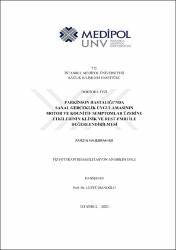| dc.contributor.advisor | Hanoğlu, Lütfü | |
| dc.contributor.author | Haj Ebrahimi, Farzin | |
| dc.date.accessioned | 2021-08-25T08:38:40Z | |
| dc.date.available | 2021-08-25T08:38:40Z | |
| dc.date.issued | 2020 | en_US |
| dc.date.submitted | 2020-07-24 | |
| dc.identifier.citation | Haj Ebrahimi, F. (2020). Parkinson hastalığı'nda sanal gerçeklik uygulamasının motor ve kognitif semptomlar üzerine etkilerinin klinik ve rest-fmrı ile değerlendirilmesi. (Yayınlanmamış doktora tezi). İstanbul Medipol Üniversitesi Sağlık Bilimleri Enstitüsü, İstanbul. | en_US |
| dc.identifier.uri | https://hdl.handle.net/20.500.12511/7970 | |
| dc.description.abstract | Parkinson Hastalığı (PH) en yaygın nörodejeneratif hastalıklardan biridir. Substantia nigra pars compacta' daki dopaminerjik nöronların fonksiyonel ve yapısal kaybı esas olarak bazal gangliyon devrelerinde uyarma ve inhibisyon dengesini değiştirir ve temel PH semptomlarına yol açmaktadır. Sanal Gerçeklik (SG) gibi son bilgisayar teknolojileri, görsel ve işitsel geribildirimler kullanarak motor ve kognitif alanlardaki problemlerin hedef alınabileceğini düşündürmektedir. Bu çalışmadaki amacımız, SG'nin PH'deki motor ve kognitif semptomlar ve dinlenim durum ağları (RSN) üzerindeki etkilerini araştırmaktır. 24 PH'li birey çalışmaya dahil edildi. Bireyler SG Grubu (n=11) ve Egzersiz Grubu (n=13) olarak iki gruba ayrıldı. Tüm bireylere farmakolojik tedavilerine ilaveten, 4 hafta boyunca haftada 3 gün, toplam 12 seans SG ve egzersiz tedavisi uygulandı. Bireyler, motor ve kognitif fonksiyon, duygu durumu, yaşam kalitesi ve RSN açısından tedaviden bir hafta önce ve iki hafta sonra değerlendirildi. Hem SG hem egzersiz grubunda tedavi sonrasında motor durum, denge, mobilite ve fiziksel kapasitede anlamlı fark bulundu (p<0.0.5). SG grubunda genel kognitif durum, dikkat, görsel anlık ve uzun süreli bellek, sözel anlık bellek, dil, vizyospasyal beceriler ve yaşam kalitesinde anlamlı fark bulundu (p<0.0.5). Egzersiz grubunda dikkat, yürütücü işlevler ve sözel uzun süreli bellekte anlamlı fark bulundu (p<0.0.5). Gruplar arasında görsel uzun süreli bellekte ve dil becerilerinde SG grubu lehine anlamlı fark bulundu (p<0.0.5). SG grubunda Lateral Oksipital Korteksin Superioru'nda (LOC-S) anlamlı artış bulundu (p<0.0.5). Gruplar arasında LOC-S'de SG grubu, Lingual Gyrus'ta egzersiz grubu lehine anlamlı artış bulundu (p<0.0.5). Sonuç olarak, hem SG ve hem egzersiz uygulamasının PH'nin klinik bulguları ve RSN'ler üzerine olumlu etkileri bulunmuştur. İlaç tedavisine ilaveten uygulanan SG ve egzersiz tedavisininin etkili bir tedavi olasılığı oluşturabileceği düşünülmektedir. | en_US |
| dc.description.abstract | Parkinson's Disease (PD) is one of the most common neurodegenerative diseases. The functional and structural loss of dopaminergic neurons in Substantia nigra pars compacta mainly changes the balance of excitation and inhibition in the basal ganglia circuits and leads to basic PD symptoms. Latest computer technologies such as Virtual Reality (VR) suggest that problems in the motor and cognition can be addressed by using visual and audio feedback. Our aim in this study is to investigate the effects of VR on motor and cognitive symptoms and resting state networks (RSN) in PD. 24 PD individuals were included in the study. Individuals were divided into two groups as VR Group (n = 11) and Exercise Group (n = 13). In addition to their pharmacological treatments, all individuals received 3 sessions of VR and exercise training 3 days a week for 4 weeks. Individuals were evaluated one week before and two weeks after treatment in terms of motor and cognitive function, mood, quality of life and RSN. There was a significant difference in motor status, balance, mobility and physical capacity after treatment in both VR and exercise groups (p<0.0.5). There was a significant difference in general cognition, attention, instantaneous and long-term visual memory, instantaneous verbal memory, language, visuospatial skills and quality of life in VR group (p<0.0.5). There was a significant difference in attention, executive functions and verbal long-term memory in the exercise group (p<0.0.5). There was a significant difference in long-term memory visual and language skills between the groups in favor of VR group (p<0.0.5). There was a significant increase in the Lateral Occipital Cortex Superior (LOC-S) in the VR group (p<0.0.5). There was a significant increase in LOC-S among the groups in favor of VR group and Lingual Gyrus in favor of exercise group (p<0.0.5). As a result, both VR and exercise training have positive effects on the clinical findings and RSN of PD. It can be inferred that the therapeutic approach involving VR and exercise therapy in addition to drug therapy may create an effective treatment in PD. | en_US |
| dc.language.iso | tur | en_US |
| dc.publisher | İstanbul Medipol Üniversitesi Sağlık Bilimleri Enstitüsü | en_US |
| dc.rights | info:eu-repo/semantics/openAccess | en_US |
| dc.subject | Dinlenim Durum Ağları | en_US |
| dc.subject | Egzersiz | en_US |
| dc.subject | fMRI | en_US |
| dc.subject | Parkinson Hastalığı | en_US |
| dc.subject | Sanal Gerçeklik | en_US |
| dc.subject | Exercise | en_US |
| dc.subject | fMRI | en_US |
| dc.subject | Parkinson's Disease | en_US |
| dc.subject | Resting State Networks | en_US |
| dc.subject | Virtual Reality | en_US |
| dc.title | Parkinson hastalığı'nda sanal gerçeklik uygulamasının motor ve kognitif semptomlar üzerine etkilerinin klinik ve rest-fmrı ile değerlendirilmesi | en_US |
| dc.title.alternative | Using clinical tests and rest-fmri to evaluate the effects of virtual reality practice on motor and cognitive symptoms in parkinson's disease | en_US |
| dc.type | doctoralThesis | en_US |
| dc.department | İstanbul Medipol Üniversitesi, Sağlık Bilimleri Enstitüsü, Fizyoterapi ve Rehabilitasyon Ana Bilim Dalı | en_US |
| dc.relation.publicationcategory | Tez | en_US |


















